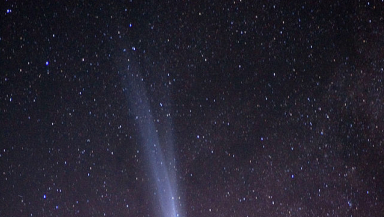
Scientists are baffled after recently discovering a black hole larger than what they believed to be possible.
The black hole was formed about 900 million years after the Big Bang, but is 12 billion times greater than the sun.
"Based on previous research, this is the largest black hole found for that period of time," said Dr. Fuyan Bian of Australian National University's Research School of Astronomy and Astrophysics.
"Current theory is for a limit to how fast a black hole can grow, but this black hole is too large for that theory."
Black holes were believed to be limited because the mass they absorb creates radiation pressure, which pushes mass away from the hole.
"Basically, you have two forces balanced together, which sets up a limit for growth, which is much smaller than what we found," Dr. Bian explained.
The mammoth-sized hole was discovered by a team of scientists led by Xue-Bing Wu of China's Peking University. The research was part of the Sloan Digital Sky Survey, which studies the northern hemisphere sky.
Bian's school will study the southern hemisphere sky as part of a project called SkyMapper, and expects more black holes to be found.
Scientists recently questioned whether the Big Bang created the universe after researchers in Canada and Egypt proposed that the universe has existed infinitely.
"As far as we can see, since different points in the universe never actually converged in the past, it did not have a beginning," Saurya Das at the University of Lethbridge in Canada explained, according to Tech Times.
"It lasted forever," Das continued. "It will also not have an end. In other words, there is no singularity."
Brian Koberlein of the Rochester Institute of Technology emphasised that the study does not question whether a Big Bang or cosmic inflation happened, but rather that it did not create the universe.













